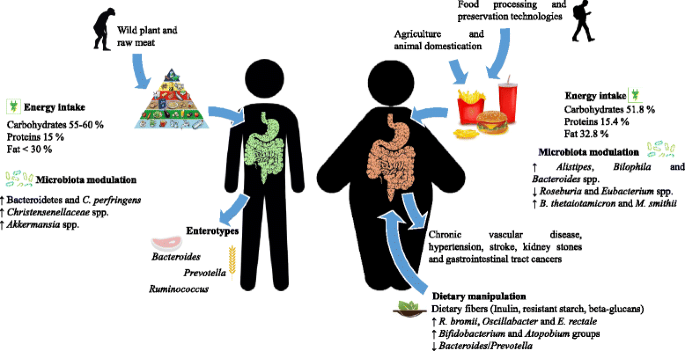The Gut Microbiome and Obesity
The complex population of bacteria that live in the gastrointestinal system is referred to as the gut microbiome as previously discussed, and it plays an important part in the process of keeping the body in good metabolic health. New research has demonstrated that dysbiosis, an imbalance in the gut microbiome, can contribute to a number of metabolic illnesses such as obesity, type 2 diabetes, and cardiovascular disease. These conditions are all linked to metabolic dysfunction.
The buildup of an unhealthy amount of fat in the body is the primary indicator of the complex disease known as obesity. It has emerged as a significant problem for public health on a global scale and has been linked to a variety of comorbid conditions, including diabetes, cardiovascular disease, and cancer. A dysfunctional state of the gut microbiome, known as dysbiosis, has been linked to increased body fat due to its influence on energy balance, inflammation, and the production of certain signaling molecules.
According to the CDC's website, obesity was a underlying medical conditionassociated with higher risk for severe COVID-19 after the epidemic Obesity (BMI >30 kg/m2 or >95th percentile in children) Since May 2021, the process has been updated to include a CDC-led review process that uses rigorous systematic review methods.
The regulation of hormones that control hunger and satiety is one of the primary ways in which an imbalance in the gut microbiota can contribute to weight gain. It is possible for the microbiome in the gut to have an effect on the synthesis of hormones like ghrelin and leptin, both of which are involved in the regulation of hunger and satiety. When there is an imbalance in the microbiome of the gut, it can lead to changes in the synthesis of certain hormones, which in turn can cause weight gain.
Dysbiosis can also lead to changes in the metabolism of certain substances, such as bile acids and short-chain fatty acids, which are known to influence weight growth. These alterations can result in weight gain. Changes in bile acid metabolism can be caused by abnormalities in the gut microbiome, which can then lead to increased fat storage and weight gain. Bile acids play an important part in the breakdown of fat. On the other hand, short-chain fatty acids are created by the bacteria that live in the gut. These acids have been associated to better insulin sensitivity, which is commonly reduced in people who are obese and have type 2 diabetes.
Inflammation is yet another mechanism through which an imbalance in the gut flora might contribute to increased body fat. A state of dysbiosis can result in an excess production of chemicals that are pro-inflammatory, which in turn can encourage the storage of fat in adipose tissue and contribute to an increase in body mass. A leaky gut, also known as intestinal permeability, is a condition that can be caused by an imbalance in the microbiome of the intestines. This condition makes it possible for potentially hazardous microbes and the byproducts they produce to enter the bloodstream, where they can contribute to systemic inflammation and the development of metabolic diseases.
In addition to being connected to obesity, disturbances in the gut microbiota have been associated with the development of type 2 diabetes and cardiovascular disease. The microbiome found in the gut has the potential to influence glucose metabolism as well as insulin sensitivity, both of which are important contributors to the development of type 2 diabetes. Changes in glucose metabolism and insulin sensitivity can be brought on by microbiome imbalances in the gut, which can in turn increase the risk of developing type 2 diabetes. In a similar vein, the microbiome of the gut can exert an influence on lipid metabolism, which can play a role in the development of cardiovascular disease.
In conclusion, metabolic illnesses such as obesity, type 2 diabetes, and cardiovascular disease are all significantly influenced by the microbiome of the gut. Dysbiosis refers to an imbalance in the microbiome of the gut, which can lead to weight gain by impacting hormones that regulate appetite and fullness, altering the metabolism of certain substances, encouraging inflammation, and having an effect on how the body processes glucose and lipids. Therefore, keeping a healthy gut microbiota through a balanced diet, regular exercise, and stress management can help promote general health, including the control of weight and the prevention of the development of metabolic disorders. This can be accomplished. In addition, it may be good to think about taking probiotic supplements or to consult with a medical expert or a trained dietitian in order to tailor the appropriate food plan to one's specific needs. Although a healthy gut microbiota can be advantageous for weight management and metabolic health, it is not a certain solution, and other factors such as genetics, the environment, and general lifestyle play a role. However, it is crucial to emphasize that while this can be beneficial, it is not a guaranteed answer. In addition, metabolic diseases are complicated problems; therefore, it is essential to confer with a medical professional in order to ascertain the most appropriate method of treatment. The study of the correlation between the gut microbiota and metabolic disorders is a research field that is expanding at a rapid rate. As our knowledge of the interaction between the gut microbiome and the host evolves, it may bring new opportunities for the prevention and treatment of metabolic disorders.



